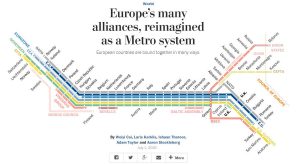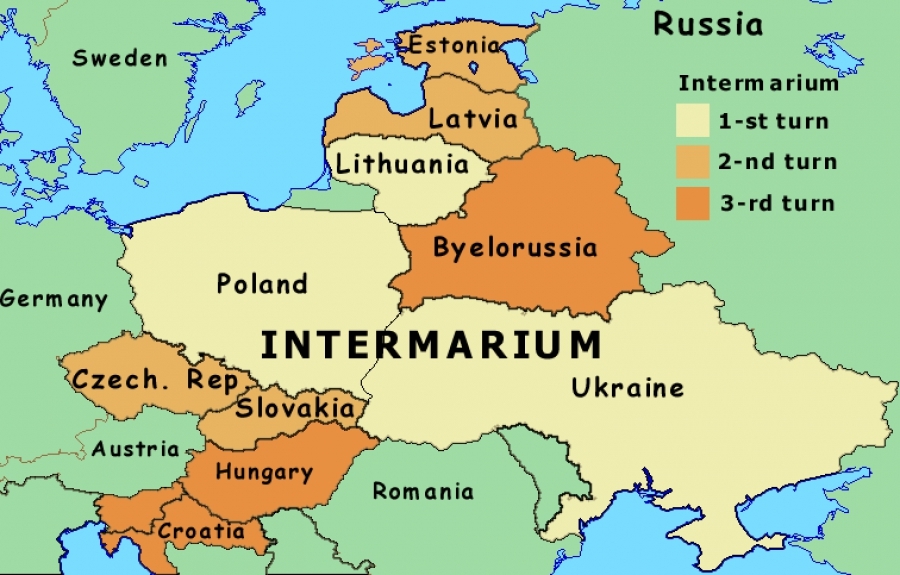The EU is now in a deep crisis, one that is the product not only of Britain’s vote to leave it but also of the organization’s “inability to stand up to the global economic crisis, Russian military-political and information expansion, international terrorism and uncontrolled mass migration,” according to Aleksandr Voronin.
As a result, many in EU countries and their neighbors are considering alternatives, the Ukrainian commentator says. One of the most intriguing is a new push for the establishment of a Baltic-Black Sea Union or “Intermarium”— not as a replacement for the EU and NATO but as a supplement and assistant to them.

Last weekend, representatives of various groups, civic, military, and political, of the so-called “countries in between” met in Kyiv to talk about the possibilities for the emergence of such a union and what steps they should take to promote its emergence and development at the present time.
Nikolay Kravchenko, one of the organizers of the meeting, said that the grouping could begin small, much as the EU did with the European Coal and Steel Community, and then grow both in size and in the spheres of activity that its members would approve. He suggested that “the forefathers of the Intermarium are GUAM, the Eastern Partnership, the Black Sea Cooperation Council and the Vyshegrad Four.

Other participants in the Kyiv meeting agreed, Voronin reports, and stressed that any such structure should not aspire to replace the EU or “even more Euro-Atlantic solidarity in the framework of NATO” but rather focus on tasks like security, energy independence, and information technology that can be handled at the level of that region.
The idea of an Intermarium has deep roots in the 19th and early 20th centuries and especially in Marshal Pilsudski’s Promethean League.
Since the end of the USSR, it has gained a following in Belarus and Ukraine. In the early 1990s, Zianon Pazniak, the first president of the Belarusian Popular Front, urged its consideration. And more recently, another Belarusian, Konstantin Volokh, called on Ukrainians to do likewise.
Even before Russia invaded Ukraine, he wrote that “it is obvious that the integration of post-socialist countries is chiefly directed at the creation of a system for the containment of eastern expansion and in the first instance by the forces and resources of those countries and peoples which experienced on their own skin the state of being hostages of the military competition between major geopolitical players and then the victims of the unification of one of the centers of socialist planning.”
This year, Voronin points out, is the 90th anniversary of the Promethean League which was founded by Polish efforts in Paris and which included representatives “not only of Crimea and Ukraine but also Azerbaijan, the Don Cossacks, Georgia, Idel-Ural, Ingria, Karelia, Komi, Kuban, the North Caucasus and Turkestan.
Many in Ukraine are now talking about a new Intermarium. Among them are Andrey Biletski, the founder of the Azov Regiment, Andrey Paruby, the speaker of the Verkhovna Rada, and most recently Vladimir Gorbulin, the head of Kyiv’s National Institute for Strategic Research.
Despite all this, the Intermarium idea has attracted relatively little attention among analysts in the West; but one indication of its rise is that Russian authors are now discussing it ever more frequently.
In a concluding section of his article entitled “Today It’s a Phantom; Tomorrow, a Strategy; and the Day after Tomorrow a Reality?” Voronin says that it is obviously too early to say that this idea has mass support. But given the crisis in the EU, “it is not excluded that soon the idea of the Intermarium will become a commonplace not only of party programs but of international memoranda.”
That is clearly what the participants in last weekend’s conference in the Ukrainian capital think. After all, they met under a banner reading “The Heart of Europe Beats in the East.”
Related:
- Could a Baltic-Black Sea alliance be taking shape?
- Ukraine: from the middle ages to a new world
- It is time for Ukraine to reinforce military cooperation with its closest partners
- Türkiye seen seeking to reanimate GUAM as anti-Russian alliances
- Russian politicians building an international extreme right alliance
- Putin uses Western values to destroy the West, Moscow analyst says
- Brexit, Putin, and ISIS nexus: geopolitical and security dimensions




